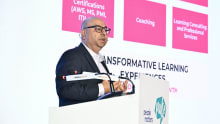Industry support is critical: Dilip Chenoy
For the current financial year 2012-13, the NSDC, which acts as an investment manager for the National Skill Development Fund, has different sets of targets.
The first relates to entities we have already funded. We have been given the mandate of skilling 250,000 people this year by the Prime Minister’s National Council on Skill Development, which is headed by the Prime Minister himself, and also includes our Chairman as one of the members. We hope to achieve this figure and perhaps even exceed the number.
The second is more than doubling the number of Sector Skill Councils. Till 2011-12, the NSDC Board had approved the formation of 11 SSCs. We are aiming to get 12 additional SSC proposals approved in the present fiscal year.
The third pertains to attracting more skills training proposals. In 2012-13, we are looking at getting our Board to approve 44 additional training initiatives, which, between them, would be capable of skilling 22-25 million people in diverse trades over a 10-year period, and also in a position to create a combined per annum training capacity of 5 million at full scale. Incidentally, our Board had till 2011-12 approved the funding of 46 training proposals.
The fourth relates to getting more corporate groups interested in the skills training initiative for graduates and post graduates in Jammu & Kashmir termed Udaan. An initiative of the Prime Minister, Udaan is a unique partnership between corporates, NSDC and the youth of Jammu and Kashmir. Udaan aims to provide skills and consequently employment to 8,000 youth from J&K per annum over a 5-year period in key high growth sectors. Some of India’s largest corporate houses are already seeing great value in this program. The support of more corporates is being garnered to scale it up.
We have developed a unique scorecard to evaluate the performance of our partners based on defined social and financial parameters. All our partners who have completed a year of operations are on track as per the plans they had submitted to us.
However, just as other skills providers, our partners, too, have to grapple with the challenges of student mobilization, and finding an answer to the question of who should be paying for the training. Till date, the NSDC has committed nearly Rs 1,400 crore to its partners.
The Skills Advisor to the Prime Minister, S. Ramadorai, and the National Skill Development Coordination Board at the Planning Commission have started reviewing the performance of the NSDC, and different government ministries/departments who also have skill development programs of their own, to give an impetus to the skills cause. As in the case of the NSDC, each of the ministries/departments of the government has been given individual targets to meet.
Historically, every parent has been keen that their children obtain a formal degree in the notion that a degree is a passport to a job or better career prospects. The perception has been that vocational and skills training are only meant for those who could not make it in the formal system.
Going forward, I foresee a greater alignment of the education system to the existing and future needs of industry and the economy, and the introduction of a system, which allows for a seamless movement from vocational to formal education and recognizes prior learning.
There are two views about it. One is that the system, which exists in India today through open schooling and IGNOU, allows movement from the vocational to the mainstream. The other view is that we need a structure and have a national qualification framework.
If we can change the mindsets of everybody wanting to get a graduate degree, align the outcomes and output of the training and education system to the needs of the economy, and ensure that the spend on one sector is not more than the other, then the question of differentiation between vocational courses and mainstream education would become redundant, because the best people with the best skills will then choose the best option for themselves.
Industry would need to play a key role in making the transformation happen. HR managers, in times to come, need to look at different metrics during the hiring process, and not just at whether the person holds a formal degree. Most importantly, a feeling needs to develop among companies that they would only be hiring skilled and industry-certified people (preferably those certified by Sector Skill Councils) at all levels and create an adequate salary differential between skilled and semi/unskilled workers.
The National Policy on Skill Development, 2009, has already given industry a prominent role in establishing India’s future skill development landscape.
As per the Policy, industry should take ownership of the skill development agenda and proactively set up Sector Skill Councils (SSCs) that would develop skill competency standards and qualifications, standardize the affiliation and accreditation process, set up Labor Market Information Systems (LMIS) to assist in the planning and delivery of training, identify skill development needs and prepare a catalog of skill types, promote academies of excellence and help in executing train-the-trainer programs. The Policy states that the industry should also be involved in the accreditation and certification processes.
The industry has to realize that skill development is far too serious an issue to be the sole preserve of the HR or CSR cells of companies. Skills-related training is a CXO level agenda and should feature prominently in Board level discussions.
Countries such as Germany and Switzerland, for example, have reaped huge dividends through industry driving the skills cause. We need to get the same level of industry involvement here for India to be able to leverage its favourable demographic profile.











